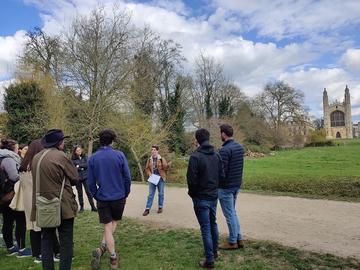Placement spotlight: Uncomfortable Cambridge
Alice Huxley and Naoise Murphy explore 'uncomfortable' histories
By Oxford student, Alice Huxley
Over the last three months, I was one of two Research and Development Associates working with Uncomfortable Oxford to expand the project to Cambridge.

© Uncomfortable Cambridge
Uncomfortable Oxford is a social enterprise which raises awareness about ‘uncomfortable’ social histories which have left their mark on the landscape of the city. The enterprise was founded by postgraduate students in 2018, and has since grown from walking tours to offer a range of educational resources, including workshops, blog articles, and a podcast. Now, it has expanded to Cambridge too!
This placement was advertised through the OOC DTP, which extended my postgraduate funding so that I could undertake the opportunity. With the support and guidance of the Uncomfortable Oxford team, I worked with my fellow Associate to develop Uncomfortable Cambridge. We researched and wrote an ‘original’ tour covering a range of ‘uncomfortable’ histories – from town/gown conflict to colonial legacies – and recruited an incredible team of guides to deliver the tour. We launched over the first two weekends of April 2022; tickets for the eight tours booked out and we raised £277 in donations for a local homelessness charity, Jimmy’s. We have since handed over the day-to-day running of Uncomfortable Cambridge – as well as a script for a further tour on the British empire – to the new Cambridge Coordinator. The ‘original’ tour is scheduled to run every weekend for the foreseeable future.
The placement gave me the opportunity to channel the research skills from my postgraduate studies into a public engagement project. At the same time, it gave me the opportunity to develop skills outside of the usual scope of my DPhil, from maintaining a website, to recruiting team members, to advertising events, to collaborating with local organisations.
For all of these reasons, I would encourage other OOC DTP students to consider a placement. And/or, if you’re around Oxford or Cambridge, why not try an ‘uncomfortable’ tour?!
----------------------------------
By Cambridge student, Naoise Murphy
Over the last three months, I’ve been working with another OOC-DTP student, Alice Huxley, and the team at Uncomfortable Oxford to launch their first expansion: Uncomfortable Cambridge. Since 2018, Uncomfortable Oxford has been running walking tours and other events to draw attention to contentious and overlooked histories in the city. Focusing on racial inequality, gender and class discrimination, and legacies of empire, their discussion-based tours use the built environment as a learning tool to examine the ongoing effects of these histories in the present.
As researchers for Uncomfortable Cambridge, Alice and I spent weeks walking around the city, examining buildings, memorials, plaques and road markings, plotting routes and negotiating access to city-centre space. Evidence of Cambridge’s uncomfortable past was everywhere: in statues, memorials, stained glass, in the names of rooms, buildings and research funds, even in empty spaces.
Our task was to contextualise these physical markers, and somehow pack the stories we found into a two-hour walking tour. We investigated the University’s financial links to the transatlantic slave trade, the eugenics behind its celebrated scientific advances, the violent resistance to women’s membership of the University, and how the Peasants’ Revolt and the English civil wars tore up the landscape of the city. We discovered how the Colleges pushed local residents out of the medieval city centre, and how local working-class women were incarcerated by the University Proctors on the assumption that any woman walking alone at night must be a sex worker. We learned about the first students of colour at the University, the gendered geographies of the city, and the legacies of homophobic discrimination and violence.
The breadth of histories we covered for this project made for a challenging but eye-opening change from the intense specialisation of PhD research. It was also a thoroughly refreshing experience to collaborate closely with Alice as a research partner, editing and polishing each other’s work, and sharing the shock and emotion of these highly-charged research topics.
Delivering our findings on the crowded streets of Cambridge, to a group of (potentially) sceptical participants, was a novel and somewhat terrifying editorial process. We needn’t have worried; our participants were almost uniformly engaged, good-humoured and supportive (except for one memorable troublemaker). We had the pleasure of recruiting a team of exceptional tour guides to take the project forward, and now we get to see it grow and develop even more.
As I turn back to my solitary thesis-writing, I’m feeling reinvigorated by this placement, confident in writing for new audiences, and more impassioned than ever about the value of the humanities for understanding the ongoing violences of the uncomfortable past in the present.
To attend an Uncomfortable Cambridge tour, visit: www.uncomfortablecambridge.co.uk/walking-tours.


